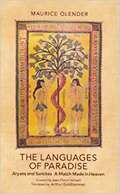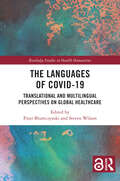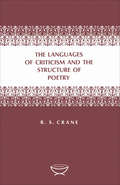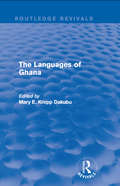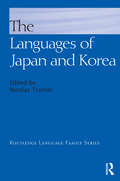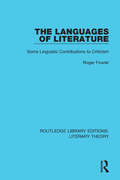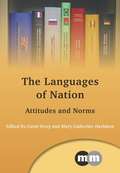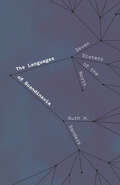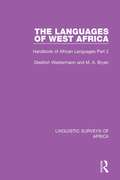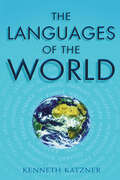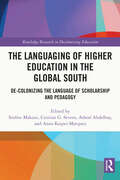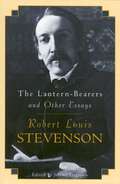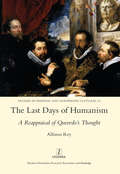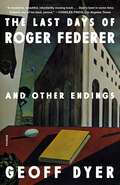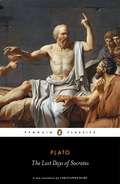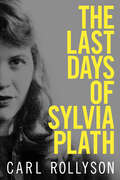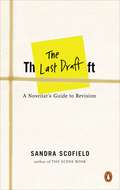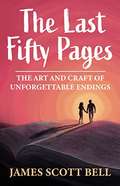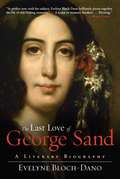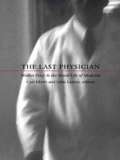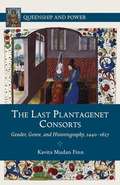- Table View
- List View
The Languages Of Paradise: Aryans And Semites A Match Made In Heaven
by Arthur Goldhammer Maurice OlenderMichel Foucault observed that "the birth of philology attracted far less notice in the Western mind than did the birth of biology or political economy." In this penetrating exploration of the origin of the discipline, Maurice Olender shows that philology left an indelible mark on Western visions of history, and contributed directly to some of the most horrifying ideologies of the twentieth century.
The Languages of COVID-19: Translational and Multilingual Perspectives on Global Healthcare (Routledge Studies in Health Humanities)
by Piotr Blumczynski and Steven WilsonThis collection advocates for languages-based, translational research to be part of the partnerships and collaborations required to make sense of, and respond to, COVID-19 as one of the major global challenges of our time. Bringing together scholars and practitioners from a wide range of disciplines, this volume is bound by a common thread stressing the importance of linguistic sensitivity, (inter)cultural knowledge and translational mediation on the frontline response to COVID-19. Featuring contributors from around the world and reflecting on the language used to frame COVID-19 in diverse cultural contexts of the Global North and Global South, the book argues that paying attention to the transmission of ideas, ideologies, narratives, and history through processes of translation results in a broadening of social, cultural and medical understandings of COVID-19. Spanning nearly twenty signed and spoken languages, the volume argues that only in going beyond an Anglophone perspective can we better understand the cultural, social and political facets of the pandemic and, in turn, produce a comprehensive efficient global response to disease management. This book will be of interest to scholars in translation and interpreting studies, modern languages, applied linguistics, cultural studies, Deaf studies, intercultural communication, and medical humanities.
The Languages of Criticism and the Structure of Poetry
by Ronald CraneThese vigorous lectures deal with some of the many ways in which the question of structure in poetry (here synonymous with the whole range of artistic creation in words) can be discussed. Criticism has never been, Professor Clare argues, a single discipline, but a collection of more and less distinct conceptual "languages," within any one of which a literary problem takes on a special solution. The Alexander Lectures for 1952.
The Languages of Ghana (Routledge Revivals)
by Mary E. Kropp DakubuFirst published in 1988, this book provides an easily accessible handbook of knowledge about the languages of Ghana; their geographical distribution, their relationships with each other, the social patterns of their use, and their structures. Besides the general introduction, it contains chapters on each of the individually recognised families of languages spoken in Ghana: Gur, Volta-Comoé, Gbe, Ga-Dangme, Central-Tongo and Mande. An additional chapter outlines the use of non-indigenous languages in the country.
The Languages of Japan and Korea (Routledge Language Family Ser.)
by Nicolas TranterThe Languages of Japan and Korea provides detailed descriptions of the major varieties of languages in the region, both modern and pre-modern, within a common format, producing a long-needed introductory reference source. Korean, Japanese, Ainu, and representative members of the three main groupings of the Ryukyuan chain are discussed for the first time in a single work. The volume is divided into language sketches, the majority of which are broken down into sections on phonology, orthography, morphology, syntax and lexicon. Specific emphasis is placed on those aspects of syntactic interest, such as speech levels, honorifics and classifiers, which are commonly underplayed in other descriptions of Modern Japanese and Korean. Each language is represented in Roman-based transcription, although its own script (where there is such an orthography) and IPA transcriptions are used sparingly where appropriate. The dialects of both the modern and oldest forms of the languages are given extensive treatment, with a primary focus on the differences from the standard language. These synchronic snapshots are complemented by a discussion of both the genetic and areal relationships between languages in the region.
The Languages of Literature: Some Linguistic Contributions to Criticism (Routledge Library Editions: Literary Theory #9)
by Roger FowlerIn The Language of Literature, first published in 1971, Roger Fowler argues that the vitality and centrality of the verbal dimension of literature, and, read as a whole, the papers in this collection imply a consistent point of view on language in literature. The author focuses on the continuity of language in literature with language outside literature, on its cultural appropriateness and adjustment, and on its power to create aesthetic patterns and to organise concepts, to make fictions. This title will be of interest to students of literary theory.
The Languages of Nation
by Carol Percy Mary Catherine DavidsonThis collection brings together research on linguistic prescriptivism and social identities, in specific contemporary and historical contexts of cross-cultural contact and awareness. Providing multilingual and multidisciplinary perspectives from language studies, lexicography, literature, and cultural studies, our contributors relate language norms to frameworks of identity beyond monolingual citizenship - nativeness, ethnicity, politics, religion, empire. Some chapters focus on traditional instruments of prescriptivism: language academies in Europe; government language planners in southeast Asia; dictionaries and grammars from Early Modern and imperial Britain, republican America, the postcolonial Caribbean, and modern Germany. Other chapters consider the roles of scholars in prescriptivism, as well as the more informal and populist mechanisms of enforcement expressed in newspapers. With a thematic introduction articulating links between its breadth of perspectives, this accessible book should engage everyone concerned with language norms.
The Languages of Native North America
by Marianne MithunThis book is a comprehensive and authoritative survey of the native North American languages. These several hundred languages show tremendous genetic and typological diversity, and offer numerous challenges to current linguistic theory. The book includes an overview of their special characteristics, descriptions of special styles, a catalog of the languages that details their locations, genetic affiliations, number of speakers, and major structural features, and lists published material on them.
The Languages of Scandinavia: Seven Sisters of the North
by Ruth H. SandersFrom fjords to mountains, schools of herring to herds of reindeer, Scandinavia is rich in astonishing natural beauty. Less well known, however, is that it is also rich in languages. Home to seven languages, Scandinavia has traditionally been understood as linguistically bifurcated between its five Germanic languages (Danish, Norwegian, Swedish, Icelandic, and Faroese) and its two Finno-Ugric ones (Finnish and Sámi). In The Languages of Scandinavia, Ruth H. Sanders takes a pioneering approach: she considers these Seven Sisters of the North together. While the two linguistic families that comprise Scandinavia’s languages ultimately have differing origins, the Seven Sisters have coexisted side by side for millennia. As Sanders reveals, a crisscrossing of names, territories, and even to some extent language genetics—intimate language contact—has created a body of shared culture, experience, and linguistic influences that is illuminated when the story of these seven languages is told as one. Exploring everything from the famed whalebone Lewis Chessmen of Norse origin to the interactions between the Black Death and the Norwegian language, The Languages of Scandinavia offers profound insight into languages with a cultural impact deep-rooted and far-reaching, from the Icelandic sagas to Swedish writer Stieg Larsson’s internationally popular Millennium trilogy. Sanders’s book is both an accessible work of linguistic scholarship and a fascinating intellectual history of language.
The Languages of West Africa: Handbook of African Languages Part 2 (Linguistic Surveys of Africa #14)
by M. A. Bryan Diedrich WestermannThis volume, originally published in 1970, presents a survey of the languages spoken in an area extending from the Atlantic coast at the Sengal River eastward to the Lake Chad region. The area covered by this volume is mainly a goegraphical one, so it follows that not all the languages included are related to one another, though a certain degree of homogeneity appears.
The Languages of the Jews
by Bernard SpolskyHistorical sociolinguistics is a comparatively new area of research, investigating difficult questions about language varieties and choices in speech and writing. Jewish historical sociolinguistics is rich in unanswered questions: when does a language become 'Jewish'? What was the origin of Yiddish? How much Hebrew did the average Jew know over the centuries? How was Hebrew re-established as a vernacular and a dominant language? This book explores these and other questions, and shows the extent of scholarly disagreement over the answers. It shows the value of adding a sociolinguistic perspective to issues commonly ignored in standard histories. A vivid commentary on Jewish survival and Jewish speech communities that will be enjoyed by the general reader, and is essential reading for students and researchers interested in the study of Middle Eastern languages, Jewish studies, and sociolinguistics.
The Languages of the World
by Kenneth Katzner Kirk MillerThis third edition of Kenneth Katzner's best-selling guide to languages is essential reading for language enthusiasts everywhere. Written with the non-specialist in mind, its user-friendly style and layout, delightful original passages, and exotic scripts, will continue to fascinate the reader. This new edition has been thoroughly revised to include more languages, more countries, and up-to-date data on populations.Features include:*information on nearly 600 languages*individual descriptions of 200 languages, with sample passages and English translations*concise notes on where each language is spoken, its history, alphabet and pronunciation*coverage of every country in the world, its main language and speaker numbers*an introduction to language families
The Languaging of Higher Education in the Global South: De-Colonizing the Language of Scholarship and Pedagogy (Routledge Research in Decolonizing Education)
by Sinfree Makoni Anna Kaiper-Marquez Cristine G. Severo Ashraf AbdelhayBy foregrounding language practices in educational settings, this timely volume offers a postcolonial critique of the languaging of higher education and considers how Southern Epistemologies can be used to further the decolonization of post-secondary education in the Global South. Offering a range of contributions from diverse and minoritized scholars based in countries including South Africa, Rwanda, Sudan, Qatar, Turkey, Portugal, Sweden, India and Brazil, The Languaging of Higher Education in the Global South problematizes the use of language in various areas of higher education. Chapters demonstrate both subtle and explicit ways in which the language of pedagogy, scholarship, policy, and partcipiation endorse and privelege Western constructs and knowledge production, and utilize Southern theories and epistemologies to offer an alternative ways forward – practice and research which applies and promotes Southern epistemologies and local knowledges. The volume confronts issues including integrationism, epistemic solidarity, language policy and ideology, multilingualism, and the increasing use of technology in institutions of higher education. This innovative book will be of interest to researchers, scholars, and postgraduate students in the fields of higher education, applied linguistics, and multicultural education. Those with an interest in the decolonization of education and language will find the book of particular use.
The Lantern-Bearers and Other Essays
by Robert Louis StevensonRobert Louis Stevenson (1850-1894) is best known as the author of The Strange Case of Dr. Jekyll and Mr. Hyde, Treasure Island, and Kidnapped, but his essays comprise an oft-overlooked trove of gems, intriguing in their content and generous in their scope. This collection of nearly three dozen of Stevenson's best essays—the only anthology of its kind— spans his brief life and includes many of his most celebrated pieces and some others previously unpublished.
The Last Days of Humanism: A Reappraisal of Quevedo's Thought
by Alfonso ReyFrancisco de Quevedo (Madrid, 1580-1645) was well known for his rich and dynamic style, achieved through an ingenious and complex manipulation of language. Yet he was also a consistent and systematic thinker, with moral philosophy, broadly understood, lying at the core of his numerous and varied works. Quevedo lived in an age of transition, with the Humanist tradition on the wane, and his writing expresses the characteristic uncertainty of a moment of cultural transition. In this book Alfonso Rey surveys Quevedo's ideas in such diverse fields as ethics, politics, religion and literature, ideas which hitherto have received little attention. New information is also provided towards a reconstruction of the cultural evolution of Europe in the years prior to the Enlightenment, and thus the scope of the book extends beyond that of Spanish literature.
The Last Days of Roger Federer and Other Endings
by Geoff DyerOne of Esquire's best books of spring 2022An extended meditation on late style and last works from "one of our greatest living critics" (Kathryn Schulz, New York).When artists and athletes age, what happens to their work? Does it ripen or rot? Achieve a new serenity or succumb to an escalating torment? As our bodies decay, how do we keep on? In this beguiling meditation, Geoff Dyer sets his own encounter with late middle age against the last days and last works of writers, painters, footballers, musicians, and tennis stars who’ve mattered to him throughout his life. With a playful charm and penetrating intelligence, he recounts Friedrich Nietzsche’s breakdown in Turin, Bob Dylan’s reinventions of old songs, J. M. W. Turner’s paintings of abstracted light, John Coltrane’s cosmic melodies, Bjorn Borg’s defeats, and Beethoven’s final quartets—and considers the intensifications and modifications of experience that come when an ending is within sight. Throughout, he stresses the accomplishments of uncouth geniuses who defied convention, and went on doing so even when their beautiful youths were over. <p><p>Ranging from Burning Man and the Doors to the nineteenth-century Alps and back, Dyer’s book on last things is also a book about how to go on living with art and beauty—and on the entrancing effect and sudden illumination that an Art Pepper solo or Annie Dillard reflection can engender in even the most jaded and ironic sensibilities. Praised by Steve Martin for his “hilarious tics” and by Tom Bissell as “perhaps the most bafflingly great prose writer at work in the English language today,” Dyer has now blended criticism, memoir, and humorous banter of the most serious kind into something entirely new. The Last Days of Roger Federer is a summation of Dyer’s passions, and the perfect introduction to his sly and joyous work.
The Last Days of Socrates
by PlatoEuthyphro/Apology/Crito/Phaedo'Nothing can harm a good man either in life or after death'The trial and condemnation of Socrates on charges of heresy and corrupting young minds is a defining moment in the history of classical Athens. In tracing these events through four dialogues, Plato also developed his own philosophy of a life guided by self-responsibility. Euthyphro finds Socrates outside the court-house, debating the nature of piety, while the Apology is his robust rebuttal of the charges against him. In the Crito, awaiting execution in prison, Socrates counters the arguments of friends urging him to escape. Finally, in the Phaedo, he is shown calmly confident in the face of death.Translated by HUGH TREDENNICK and HAROLD TARRANT with an Introduction and notes by HAROLD TARRANT
The Last Days of Sylvia Plath
by Carl RollysonIn her last days, Sylvia Plath struggled to break out from the control of the towering figure of her husband Ted Hughes. In the antique mythology of his retinue, she had become the gorgon threatening to bring down the House of Hughes. Drawing on recently available court records, archives, and interviews, and reevaluating the memoirs of the formidable Hughes contingent who treated Plath as a female hysteric, Carl Rollyson rehabilitates the image of a woman too often viewed solely within the confines of what Hughes and his collaborators wanted to be written. Rollyson is the first biographer to gain access to the papers of Ruth Tiffany Barnhouse at Smith College, a key figure in the poet’s final days. Barnhouse was a therapist who may have been the only person to whom Plath believed she could reveal her whole self. Barnhouse went beyond the protocols of her profession, serving more as Plath’s ally, seeking a way out of the imprisoning charisma of Ted Hughes and friends he counted on to support a regime of antipathy against her. The Last Days of Sylvia Plath focuses on the train of events that plagued Plath’s last seven months when she tried to recover her own life in the midst of Hughes’s alternating threats and reassurances. In a siege-like atmosphere a tormented Plath continued to write, reach out to friends, and care for her two children. Why Barnhouse seemed, in Hughes’s malign view, his wife’s undoing, and how biographers, Hughes, and his cohort parsed the events that led to the poet’s death, form the charged and contentious story this book has to tell.
The Last Draft: A Novelist's Guide to Revision
by Sandra ScofieldThe definitive handbook for the novelist who is ready to revise This wise and friendly guide shows writers how to turn first-draft manuscripts into the novels of their dreams. A critic, longtime teacher, and award-winning novelist, Sandra Scofield illustrates how to reread a work of fiction with a view of its subject and vision, and how to take it apart and put it back together again, stronger and deeper. Scofield builds her explanations around helpful concepts like narrative structure, character agency, and core scenes, using models from classic and contemporary writers. The detailed, step-by-step plan laid out in The Last Draft offers invaluable advice to both novice and experienced writers alike. In Scofield, they will find a seasoned, encouraging mentor to steer them through this emotional and intellectual journey.
The Last Fifty Pages: The Art and Craft of Unforgettable Endings
by James BellWhat are the secrets for writing a great ending for your novel? How do you leave readers so satisfied that they'll want another book by you—right now? What tools and techniques can shape your last fifty pages into a powerful, unforgettable experience?
The Last Love of George Sand: A Literary Biography
by Evelyne Bloch-DanoGeorge Sand is one the most celebrated writers and controversial personalities of nineteenth-century France; she is as famous for her bohemian lifestyle as for her written work. The Last Love of George Sand portrays the writer, political activist, and cultural figure as she starts a new chapter in her ever-surprising life: the mature years with her last lover, the young and talented engraver Alexandre Manceau. A turning point came for George Sand in 1849. After her political involvement in the revolution of 1848, Sand retreated to her country property, Nohant, with her son Maurice and started writing new plays. One day, Maurice introduced her to Alexandre Manceau, a young and shy artist thirteen years her junior. At forty-five, she was at the pinnacle of her career. She had a long history of tumultuous love affairs with famous artists such as Musset, Chopin, and Mérimée, but she had never experienced a peaceful and balanced relationship. With Manceau, Sand discovered that she could be loved, and fall in love herself, without drama. Their relationship would last fifteen years, and prove to be the most prolific period of Sand's life, with fifty books published including the novels Elle et lui, inspired by her relationship with Musset, and Le dernier amour, written just ten days after Manceau died of tuberculosis. Although much has been written about George Sand, most of the previous biographies are focused on her more turbulent times. In The Last Love of George Sand, Evelyne Bloch-Dano looks back on Sand's life from the vantage point of her years with Manceau.
The Last Man and Gothic Sympathy (Elements in the Gothic)
by Michael CameronThis Element explores the theme of 'Gothic sympathy' as it appears in a collection of 'Last Man' novels. A liminal site of both possibility and irreconcilability, Gothic sympathy at once challenges the anthropocentric bias of traditional notions of sympathetic concern, premising compassionate relations with other beings – animal, vegetal, etc. – beyond the standard measure of the liberal-humanist subject, and at the same time acknowledges the horror that is the ineluctable and untranslatable otherness accompanying, interrupting, and shaping such a sympathetic connection. Many examples of 'Last Man' fiction explore the dialectical impasse of Gothic sympathy by dramatizing complicated relationships between a lone liberal-humanist subject and other-than-human or posthuman subjects that will persist beyond humanity's extinction. Such confrontations as they appear in Mary Shelley's The Last Man, H.G. Wells's The Time Machine, and Richard Matheson's I Am Legend will be explored.
The Last Mile (Comprehension Power Readers)
by Modern PressThe story of a Pony Express rider with a very smart horse.
The Last Physician: Walker Percy and the Moral Life of Medicine
by Carl Elliott John LantosWalker Percy brought to his novels the perspective of both a doctor and a patient. Trained as a doctor at Columbia University, he contracted tuberculosis during his internship as a pathologist at Bellevue Hospital and spent the next three years recovering, primarily in TB sanitoriums. This collection of essays explores not only Percy's connections to medicine but also the underappreciated impact his art has had--and can have--on medicine itself. The contributors--physicians, philosophers, and literary critics--examine the relevance of Percy's work to current dilemmas in medical education and health policy. They reflect upon the role doctors and patients play in his novels, his family legacy of depression, how his medical background influenced his writing style, and his philosophy of psychiatry. They contemplate the private ways in which Percy's work affected their own lives and analyze the author's tendency to contrast the medical-scientific worldview with a more spiritual one. Assessing Percy's stature as an author and elucidating the many ways that reading and writing can combine with diagnosing and treating to offer an antidote to despair, they ask what it means to be a doctor, a writer, and a seeker of cures and truths--not just for the body but for the malaise and diseased spirituality of modern times. This collection will appeal to lovers of literature as well as medical professionals--indeed, anyone concerned with medical ethics and the human side of doctoring.Contributors. Robert Coles, Brock Eide, Carl Elliott, John D. Lantos, Ross McElwee, Richard Martinez, Martha Montello, David Schiedermayer, Jay Tolson, Bertram Wyatt-Brown, Laurie Zoloth-Dorfman
The Last Plantagenet Consorts
by Kavita Mudan FinnAn examination of fifteenth-century British queens through literature and history.
